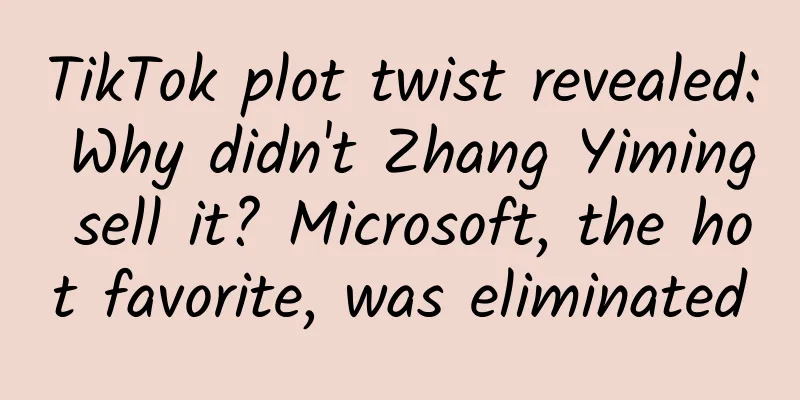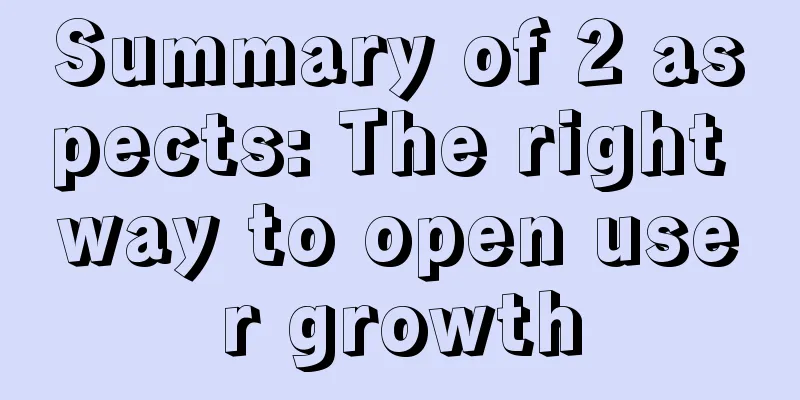TikTok plot twist revealed: Why didn't Zhang Yiming sell it? Microsoft, the hot favorite, was eliminated

|
Reuters published an article revealing the inside story of ByteDance's sudden abandonment of the sale of TikTok's US business. The article said that Zhang Yiming was under pressure from ByteDance investors. Sequoia Capital and General Atlantic Investment Group were worried that the sale would lead to TikTok's US business being sold at a low price. At the same time, Microsoft's offer of more than $20 billion did not meet the expectations of ByteDance investors, and Microsoft called TikTok a security risk, which disappointed Zhang Yiming. In contrast, Oracle executives' relationship with Trump increased the chances of the agreement being passed. The following is the full article:ByteDance Inc. founder and CEO Zhang Yiming’s decision not to pursue a sale of TikTok’s U.S. business to Microsoft Corp. in favor of a partnership with Oracle Corp. is the culmination of investor pressure on the Chinese company as it seeks a deal that satisfies both China and the United States, people familiar with the matter said. Why did Zhang Yiming suddenly stop selling?Sources said that ByteDance's investors such as Sequoia Capital and General Atlantic were worried about the financial impact of the sale, fearing that TikTok's US business would be sold at a price lower than its actual value, which led Zhang Yiming to choose to sell only shares to Oracle rather than completely divest. This is a risky move. US President Trump has made it clear that he wants to see TikTok sell its US business directly to an American technology company. He also threatened that if ByteDance does not agree, he will ban TikTok as early as September 20. Meanwhile, China also intervened in the sale process of TikTok last month, updating its export control regulations to gain control over the transfer of technology, such as TikTok's recommendation algorithm. Chinese officials have said ByteDance should not be coerced into a deal by the United States. Microsoft is outMicrosoft executives have grown increasingly frustrated over the past week as ByteDance has stopped responding to Microsoft’s more than $20 billion offer, which would have provided ByteDance with additional payments in the future based on TikTok’s performance, people familiar with the matter said. Microsoft's offer fell short of ByteDance investors' expectations. Microsoft defended its offer to convince the Trump administration and U.S. lawmakers, but it also hurt Zhang Yiming because Microsoft called TikTok a security risk they could address. In contrast, ByteDance has always insisted that its ownership of TikTok poses no such risk. Meanwhile, Sequoia Capital and General Atlantic have been working with Oracle on an alternative deal that would avoid a complete sale of TikTok's U.S. business, the sources said. Microsoft was concerned about ByteDance's indifference, so it asked ByteDance whether it had lost the battle for TikTok's US business. Microsoft also asked whether it could change the transaction structure to match Oracle's offer. ByteDance responded that even if Microsoft offered the same structure and terms, the company would still choose Oracle. It is reported that Oracle has been working on potential transaction arrangements with ByteDance's investors in the past few weeks, which makes ByteDance's investors and Zhang Yiming feel more comfortable with their partnership. So last Sunday, Microsoft announced that ByteDance had rejected the software giant's offer to acquire TikTok's U.S. business. ByteDance and Microsoft did not immediately respond to requests for comment. Oracle declined to comment beyond a statement earlier on Monday confirming its involvement in a proposed deal. Sequoia Capital and General Atlantic declined to comment. Zhang Yiming characterized it as "reorganization"Sources said that in the past few days, ByteDance has been actively working on a deal proposal that would allow ByteDance to retain a small stake in TikTok while alleviating U.S. security concerns. Zhang Yiming called the deal a "reorganization" when discussing it with other ByteDance executives. One source said the arrangement is similar to a joint venture. Oracle is in talks to acquire a sizable minority stake in TikTok's U.S. business, with the remainder held by some of ByteDance's largest investors, such as Sequoia Capital and General Atlantic. Oracle will also take over management of TikTok's U.S. data and be responsible for its security. It is unclear how much the deal values TikTok's U.S. business, which has as many as 100 million users. The agreement also requires the Committee on Foreign Investment in the United States (CFIUS) to approve the appointment of directors for TikTok's U.S. business and TikTok's relationships with major suppliers. The arrangement is similar to the conditions that CFIUS put forward when it approved Lenovo's acquisition of IBM's PC business in 2005 and SoftBank Group's acquisition of U.S. wireless operator Sprint in 2013, according to reports. ByteDance also plans to argue that CFIUS’s approval of China Oceanwide Holdings Group’s acquisition of U.S. insurer Genworth Financial two years ago set a precedent for its proposed partnership with Oracle. In that deal, China Oceanwide agreed to use a U.S.-based third-party service to manage Genworth’s U.S. policyholder data. ByteDance will argue that a similar arrangement with Oracle protects the data of TikTok’s U.S. users. Job promises, Oracle executives and Trump tiesByteDance has made other concessions to appeal to Trump, the sources said. ByteDance has proposed that TikTok create 25,000 jobs, far more than the company's current U.S. workforce of just over 1,000. ByteDance also hopes that Oracle founder Larry Ellison's fundraiser for Trump and Oracle CEO Safra Catz's experience as a member of Trump's transition team four years ago will improve the chances of its deal with Oracle being approved by Trump. So far, the White House has remained silent on its discussions with ByteDance, and it is unclear whether the proposed deal will move forward. On Monday, Treasury Secretary Steven Mnuchin said CFIUS would review the deal this week and then make a recommendation to Trump. The White House has not yet commented. According to China's newly announced export control regulations, if ByteDance wants to transfer the TikTok algorithm to a foreign buyer, it needs to obtain approval from Chinese regulators. Sources said that the agreement reached between ByteDance and Oracle does not require the former to apply for an export license for the TikTok algorithm from relevant Chinese authorities. |
>>: WeChat finally took action against primary school students
Recommend
How can SaaS companies reduce user churn?
Reducing customer churn is a proven way for SaaS ...
How to Improve User Experience by Developing WeChat Mini Programs for Home Appliances
At present, both in terms of performance and oper...
To protect the security of WeChat and Alipay, use these five functions of your mobile phone with caution!
Nowadays, Alipay and WeChat are the most common t...
Brand promotion: How to make data brands generate value!
Data is an asset. For online brand promotion , th...
Methodology for operating top short video influencers!
Short videos in the field of magic also attract p...
Combining Vue.js's front-end compression image solution
[[175194]] It's a simple solution. Well, it&#...
A comprehensive summary of design anomalies and how to handle them
In design, some abnormal situations are often eas...
How to attract users through business?
Most operational work is generated with the Inter...
up to date! Traffic rankings of 33 information flow platforms, a must-read for advertising!
Do you want to know how the major information flo...
Search Ads Keyword Optimization Guide
New feature of Baidu Marketing Optimization Cente...
Analysis of the characteristics of the huge amount of Qianchuan hot-selling materials + production guide
This article analyzes the characteristics of some...
5 easy-to-use data visualization platforms to make your data analysis more efficient and high-end
The effect is amazing! Make your friends envious ...
Forget 100k+! Marketing trends I learned in the United States
Today, Chinese companies are facing more and more...
What does it mean that Trump’s wealth has shrunk by $300 million in one year? How much wealth does Trump have now?
What does it mean that Trump’s wealth has shrunk ...
What is Encyclopedia Promotion? How to do Encyclopedia Promotion?
With the continuous development of the Internet, ...









